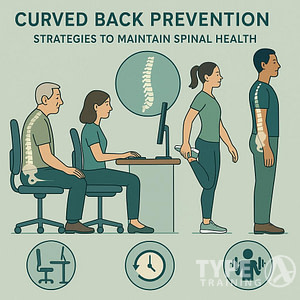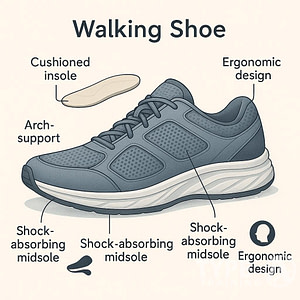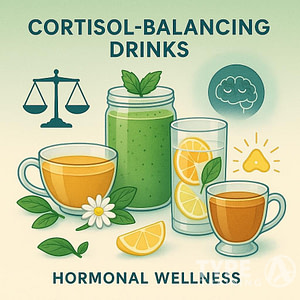The interconnectedness of our physical activities, nutritional choices, and mental health is undeniable.
When you prioritize regular exercise, it does more than just improve your physical fitness; it also boosts your mood and mental clarity.
Similar effects are seen with nutrition; what you eat has the power to significantly influence your cognitive function and emotional well-being.
This intricate relationship means that maintaining a balanced diet and staying physically active are not just beneficial for your body but are essential for a healthier mind.
Popular posts:
Understanding the role of nutrition in mental health is critical.
Specific nutrients from your diet can impact brain function, affecting your mood and the risk of mood disorders.
Conversely, your mental health can influence your dietary choices and nutritional status.
This two-way street underscores why adopting a lifestyle that integrates both fitness and nutritious eating is fundamental for overall well-being.
Recognizing the power of the gut microbiome, which plays a crucial role in this connection, can lead to proactive mental health interventions that include dietary modifications.
Key Takeaways
- Engaging in regular physical activity can uplift your mental state.
- A balanced diet is pivotal in supporting cognitive health and emotional stability.
- Your gut health is a significant factor in shaping your mental well-being.
The Science of Nutrition’s Role in Mental Health
Your diet significantly impacts your brain function and, consequently, your mental health.
Nutritional psychiatry has uncovered links suggesting that what you consume can affect mood and cognitive processes.
Understanding the Fundamentals
It’s crucial for you to understand that mental health and nutrition are interconnected.
The foods you eat provide the nutrients necessary for the neurotransmitters in your brain, which are the chemical messengers that help regulate your mood and cognitive functions.
An imbalance in these nutrients can lead to alterations in brain structure and function, influencing your mental health.
For example, fats in your diet, especially omega-3 fatty acids, are essential for brain health as they make up part of the cell membranes around neurons and are instrumental in the communication between brain cells.
Diets poor in quality fats might lead to dysfunctional cell membranes and subsequently, compromised brain function.
Similarly, vitamins and minerals play key roles in brain health:
- B-vitamins are critical for energy production in the brain and the synthesis of neurotransmitters. Deficiencies in B-vitamins can lead to fatigue and impaired mental function.
- Minerals like zinc and magnesium are crucial for neurotransmitter activity and nerve function.
Nutrition and Brain Function
What you put on your plate matters tremendously for your brain function.
For optimal mental health, your diet should be rich in a variety of nutrients:
- Fats: Ensure you consume adequate eicosapentaenoic acid (EPA) and docosahexaenoic acid (DHA), two key types of omega-3 fatty acids found in fish and flaxseeds.
- Vitamins: Vitamins such as B12 and D are particularly important for cognitive health and preventing mood disorders.
- Minerals: Make sure to include sources of magnesium and zinc, which are found in nuts, seeds, and leafy green vegetables.
A well-balanced diet that combines these nutrients can help protect the health of your brain and influence your mood and mental well-being.
The connection between dietary patterns, such as a Western-style diet, and mental health issues has been observed, hinting at the importance of maintaining a varied and nutrient-dense diet for mental health support.
Exploring the Link Between Diet and Mood Disorders
Your diet plays a significant role in how you feel, both physically and mentally.
Emerging research suggests that what you eat can impact your likelihood of experiencing mood disorders such as depression and anxiety.
Dietary Patterns and Mental Health
Balanced Diets: Consistent evidence indicates that a balanced diet, rich in fruits, vegetables, whole grains, and lean proteins, can be beneficial for your mental health.
For example, the Mediterranean diet, which emphasizes these foods, has been linked to a reduced risk of depression. This diet also includes healthy fats, like those from olive oil and fish, which are crucial for brain health.
High-Sugar and Processed Foods: On the opposite end, diets that are high in sugar and processed foods may increase your risk of mood disorders.
An overconsumption of these foods can lead to inflammation, which research suggests may have a connection to depression and anxiety.
Specific Nutrients and Mood Regulation
Omega-3 Fatty Acids: Omega-3 fatty acids, found in fish like salmon, play a role in brain health and mood regulation.
Notably, they are involved in the neurotransmission of serotonin, a key hormone that stabilizes your mood, feelings of well-being, and happiness.
Deficiencies in omega-3 could lead to an increased risk of mood disorders, including depression.
B Vitamins: B vitamins, specifically B12 and folate, have been shown to help decrease depressive symptoms.
They are involved in the synthesis of serotonin and dopamine—neurotransmitters critical for mood regulation.
Ensuring your diet includes enough B vitamins can be a step toward stabilizing mood and reducing symptoms of depression.
Fitness as a Foundation for Mental Well-being
You might already be aware that fitness goes beyond muscle mass and endurance; it is critical for your mental health as well.
Regular physical activity can significantly improve brain health and emotional stability.
Physical Activity and Brain Health
Physical activity is not just a catalyst for physical transformation but also plays a vital role in enhancing brain health.
Research indicates that staying active can increase energy levels and cognitive function.
Engaging in consistent exercise can lead to structural changes in the brain, such as increased volume in the hippocampus—an area essential for memory and learning.
- Energy: Regular exercise boosts your energy level, enabling you to perform better in all aspects of life.
- Cognitive Function: Active individuals often experience sharper memory and thinking, which is linked to better blood flow to the brain.
Exercise and Emotional Balance
When it comes to maintaining emotional balance, exercise is a powerful tool.
It is well-documented that your mood can be lifted and self-esteem improved through regular physical activity.
- Mood Improvement: By releasing endorphins, exercise helps to improve your mood, reducing feelings of stress and anxiety.
- Self-Esteem: Achieving fitness goals can empower you, fostering a sense of accomplishment and elevating your self-esteem.
Healthy Dietary Choices for Body and Mind
Making strategic dietary choices plays a pivotal role in enhancing both your physical health and mental wellbeing.
The Role of Whole Foods
Whole foods, such as vegetables, fruits, and whole grains, should be the cornerstone of your diet. They are rich in essential nutrients, fiber, and antioxidants which support brain function and overall health.
- Vegetables: Aim for variety and color. Leafy greens such as spinach and kale are high in folate, which contributes to neurotransmitter function.
- Fruits: Citrus fruits, berries, and apples provide vitamin C and flavonoids, supporting brain health by reducing inflammation.
- Whole grains: Opt for quinoa, brown rice, or oatmeal, which supply steady energy to your brain through complex carbohydrates and fibers.
Avoiding Harmful Dietary Elements
To protect your mental health, it’s crucial to minimize the intake of foods high in sugar and saturated fat while embracing sources of unsaturated fats and healthy fats.
- Sugar: Avoid excessive amounts of sugar, particularly refined sugars found in processed foods. They can trigger fluctuations in your blood sugar levels, impacting your mood and energy levels.
- Saturated Fat: Too much saturated fat, often found in fried foods and red meat, can be detrimental to both your cardiovascular and mental health.
- Unsaturated Fats: Embrace foods high in unsaturated fats like avocados and nuts. These healthy fats are linked to reduced risk of cognitive decline.
The Impact of Specific Diets on Psychological Health
Diet can play a pivotal role in your mental health, with certain dietary patterns offering benefits and others posing risks. Let’s examine how the Mediterranean diet can bolster psychological well-being, while a Western diet may increase mental health risks.
Mediterranean Diet and Mental Health
The Mediterranean diet, rich in vegetables, fruits, legumes, whole grains, fish, and olive oil, is notable for its abundance of omega-3 fatty acids and anti-inflammatory properties. This diet’s benefit to mental health is supported by research suggesting that it may improve your mood and protect against depression.
Your body and mind benefit from the anti-inflammatory effects and lower glycaemic index foods that characterize this diet, leading to better overall mental well-being.
- Key Components: Olive oil, fish, whole grains, fruits, vegetables, legumes, nuts.
- Mood-related Benefits: May reduce the risk of depression; associated with a natural mood lift.
Western Diet and Mental Health Risks
In contrast, the Western diet—typified by high consumption of red meat, processed foods, and sugary beverages—can have detrimental effects on your mental health. Studies connect this diet with increased likelihood of depression and anxiety.
The high glycemic load from processed carbohydrates and the scarcity of omega-3 fatty acids can exacerbate inflammation and distress, potentially impairing psychological health.
- Concerns: High in processed foods; low in nutrients critical for cognitive function.
- Risks: Associated with higher rates of depression and anxiety; may deteriorate mental health.
Mental Health Interventions Involving Nutrition
Your mental health may significantly improve through targeted dietary interventions and supplementation, which have become important components in the therapeutic landscape. These nutritional strategies are geared towards mitigating mental health issues by addressing dietary deficiencies or contributing to an anti-inflammatory state in your body.
Dietary Intervention in Clinical Settings
In clinical settings, dietary interventions often focus on integrating whole foods with anti-inflammatory properties to manage and treat mood disorders.
For example, the adoption of a Mediterranean diet rich in omega-3 fatty acids, antioxidants, and fiber can help reduce symptoms of depression and anxiety.
Your treatment plan may include guidance from a nutritionist who can tailor your diet to include nutrient-dense foods that support brain health and overall wellbeing.
Supplementation and Mental Health Treatments
Supplementation can complement dietary changes in mental health treatments, particularly when specific nutrient deficits are identified.
Common supplements include multinutrient supplements and probiotics; the former can provide comprehensive nutritional support, while the latter may benefit your mental health by improving gut microbiota balance.
Make sure to approach supplementation under professional guidance to ensure that doses are effective and safe for your circumstances.
The Influence of Gut Microbiome on Mental Health
Emerging research reveals that your gut microbiome—a vast community of microorganisms within your digestive system—plays a significant role in your mental health. This complex ecosystem communicates with your brain through various pathways, influencing your mood and overall well-being.
Gut-Brain Axis
The gut-brain axis is the bi-directional communication network that links your enteric nervous system (ENS) with your central nervous system (CNS).
This intricate system not only includes neural connections but also encompasses hormonal, metabolic, and immune communication.
For example, neurotransmitters found in the gut, such as serotonin, can have an impact on factors like mood and emotions. Disruption in the gut microbiota has been associated with a range of mental health disorders, including anxiety and depression.
Probiotics and Mental Health
Probiotics are beneficial bacteria that are often touted for their positive effects on gut health. But did you know they may also benefit your mental health?
Consuming probiotics can potentially improve your mood by altering the gut microbiota composition and optimizing gut-brain axis communication.
For individuals with conditions like diabetes, which has been linked to alterations in the gut microbiome, probiotics may offer mental health benefits alongside metabolic improvements.
Keep in mind that, while probiotics have shown promise, further research is necessary to fully understand their role in mental health.
Frequently Asked Questions
Understanding the interplay between fitness, nutrition, and mental health is vital as they are directly linked. These elements work synergistically to improve overall well-being.
How does regular physical activity influence mental well-being?
Regular physical activity has been shown to reduce symptoms of depression and anxiety. When you engage in exercise, your body releases endorphins that act as natural mood lifters.
What are the best types of exercise to improve mental health?
Aerobic exercises like jogging, swimming, cycling, and walking have been proven to reduce anxiety and depression. Mind-body exercises such as yoga and tai chi also support emotional balance.
In what ways does diet impact one’s mental health and emotional wellness?
Your diet plays a crucial role in brain health. Nutrient-rich foods support neurotransmitter function, which can enhance mood and cognitive function, while a poor diet may exacerbate symptoms of mental health disorders.
Can improvements in nutrition contribute to the treatment of mental illnesses?
Evidence suggests that dietary improvements can be a valuable adjunct to traditional mental health treatments, potentially contributing to the management of symptoms in conditions like depression and anxiety.
What statistics support the link between exercise and mental health outcomes?
Research indicates that engaging in at least 30 minutes of moderate-to-intense exercise three to five times a week can yield a 30-50% reduction in symptoms of depression and anxiety.
Why should mental health considerations be included in physical health and fitness regimes?
Incorporating mental health strategies into your fitness regime acknowledges the holistic nature of health.
Exercise and diet have direct effects on mental health, so it’s important to consider these factors for a comprehensive approach to your well-being.













